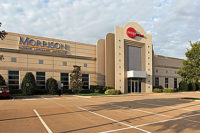Change can bring with it different levels of uncertainty.
When Fort Worth, Texas-based Morrison Supply Co. President Stan Allen joined the company a year ago he noticed a tinge of that uncertainty among employees.
At the time, Morrison was fresh off global private equity giant Advent International closing a significant majority investment in the company. “When you acquire a company there is that natural anxiety among employees. What’s going to happen? What’s coming next?” Allen says.
A year later, Allen has seen that uncertainty evaporate. “From the first half of last year when I came in to the last 120-180 days there has been a great transformation,” he says. “Everybody is looking forward instead of looking back. People are getting down to business here instead of worrying about things such as will their position be eliminated. People are very focused and excited about our future. The unknown is now very clear for them.”
Morrison, which services the plumbing, HVAC, mechanical/industrial PVF, oil and gas supplies, appliances, and underground utility markets, ranked No. 13 in the 2012 Supply House Times Premier 125 listing of top PHCP wholesalers with 2011 fiscal sales of more than $500 million. Now under the direction of former Wolseley CEO Chip Hornsby and an executive management team loaded with successful industry veterans, Morrison continues to strategically expand its footprint while still maintaining its laser-focused mission of providing superior product availability and customer service at the local branch levels. These are staples that have been in place dating back to the company’s founding in 1917 as Fort Worth Pump & Windmill Co.
Putting together a plan
Hornsby is no stranger to the plumbing wholesale business. After a long tenure under the umbrella of Ferguson and its parent company Wolseley, including a stint based in the United Kingdom as Wolseley’s CEO, Hornsby was ready to get back into the game. After a non-compete agreement expired, he formulated a business plan and started researching private equity firms, landing at Advent in late 2010. A list of possible acquisition targets was put together and Morrison was at the top of the list. The Advent-Morrison deal closed in November 2011.
“It’s great to be back on the operations side of the business,” Hornsby says. “There was a different set of circumstances in the United Kingdom. Wolseley is such a large, publically traded company that I was spending a lot of time with shareholders, pension funds and analysts. I didn’t have the time to get as involved as I am today in the operating side of our business. It’s nice to have a single lord today instead of hundreds of shareholders with varying opinions. Decisions can be made quickly, allowing us to take advantage of various opportunities. When I was deciding what I was going to do next, I eventually determined I know what I know and I know what I love. I’m thrilled to be here at Morrison. I love what I do.”
Hornsby wasted little time in assembling an all-star executive management team. Allen, whose history with Hornsby dates back to being hired by him more than 25 years ago as a trainee directly out of college, was Ferguson’s HVAC vice president for the last four years. Vice President of Supply Chain Mark Kirby is a 35-year industry veteran and also has a Ferguson-Wolseley pedigree, including running all sourcing for the parent company’s European interests.
Chief Operating Officer Kevin Moore, appointed to the position last November, has been with Morrison for 22 years and most recently was the company’s director of HVAC. Vice President of Corporate Development Dan Filler came from the corporate consulting field and had previous ties to Advent International.
“We are placing a huge emphasis on growth,” Hornsby says. “We’ve restructured by appointing regional managers and business group managers who focus on particular customer types. All these steps are to position us for further growth.”
Kirby had most recently been working on the manufacturing side for a well-known hose and piping company when he received a phone call from Hornsby with an offer to join the Morrison team.
“I was having a lot of fun working in manufacturing,” he says. “Chip called and I told him I was in the process of building a house and we were going to push dirt in two days. After 30 minutes, I knew what I wanted to do. I wouldn’t have done it for anybody but Chip. I trust him immensely.”
Hornsby’s goals for Morrison are direct and to the point. “In the next five years our goal is to be a $2 billion-plus company,” he says. “We want this company to be the best place in the country to work. We want to set Morrison up for decades of growth and success for our people.”
Smart expansion
Since the Advent deal, Morrison has been active on the acquisition front. In addition to acquiring the showroom assets of Kitchen Design Group in Shreveport, La., Rogers Supply in Enid, Okla., and Texarkana, Texas-based Dixie Utility Supply in bolt-on transactions, Morrison recently added Santa Monica, Calif.-based Express Pipe & Supply.
Express, which will retain its company name, is the third-largest plumbing supply company in Southern California (ranked 57th on the Supply House Times 2012 Premier 125 list) and features 13 branches, including the late February asset acquisition of Santee, Calif.-based Teal Pipe & Supply.
Despite venturing away from the company’s longtime strongholds of Texas, Louisiana, Oklahoma, Kansas and New Mexico with the Express transaction, Hornsby says Morrison is not necessarily headed down a path of country-wide expansion.
“I wouldn’t say it’s national,” he says. “It’s more multiregional. Our model is different. We want to partner with leading regional companies and capitalize on unique opportunities to win market share and acquire other strategic opportunities in those territories.”
Filler says any type of acquisition must factor in the existing business itself instead of having a sole focus on geography. “One of the ways we minimize risk is by making sure we partner with experts in the local market,” he says. “Southern California makes sense. Chip had quite a bit of experience in that market. Express understands the market and does things the right way. We’re making sure we partner with companies that are viewed favorably by customers and by the marketplace. We have that here with Express.”
There has been plenty of recent greenfield growth at Morrison as well. Moore notes the company has new Texas branches in League City, New Braunfels, Laredo and northwest San Antonio, along with Houston and Bastrop. Those six locations opened within the last year.
“What’s so good about our model is we don’t have a bunch of players who go buy somebody and then infiltrate the company,” Kirby says. “We acquire well-run companies and give them the capital and input to further build their companies.”
Kirby is particularly excited about the company’s new 128,000-sq.-ft. distribution center slated to open this month just north of the Dallas-Ft. Worth International Airport. Morrison currently has smaller separate Texas-based distribution centers in Austin (plumbing) and Houston (PVF).
“This allows us to do some different things and have better efficiency,” he says. “We’re moving two DCs into one and it gives us some room to grow. We’re creating a huge support foundation.”
Other key short-term initiatives include the recent introduction of a new corporate website (at www.morsco.com), the continued introduction of private-label brands to further enhance the strength of the company’s 32 showrooms, as well as a greater emphasis on vendor-managed inventory.
“With VMI you don’t have to buy full truckloads of materials,” Kirby says. “You do it in a manner that makes sense for you and the supplier. The keys are fill rates and ordering material in an efficient way to provide even better service to our customers.”
Keeping it local
While private equity and expansion have been the buzz around Morrison the last 18 months, the company isn’t taking its foot off the gas when it comes to its long-held philosophy regarding its more than 100 wholesale locations throughout the Southwest and now California.
“The focus is still empowering managers at the local level,” Hornsby says. “Branch managers have the autonomy to run their business locally. That’s a huge part of our success. We want our local branches to service the heck out of their local customers. Our branch managers are able to react very quickly to local needs and expectations. I’m a firm believer in having inventory at the local level and having immediate access to it.”
Kirby adds: “The challenge is how to create an advantage without creating a huge cost structure, which creates a network where it’s hard to get decisions made. We have a very flat corporate structure. We are able to make quick decisions and we’re not going to lose that ability as we go down this road we are on.”
Allen feels some centralization is important going forward, but too much in a customer-focused industry can be a detriment.
“You have to mesh the best of both worlds,” he says. “We want to leverage our back-office and purchasing capabilities and provide alignment on brands and strategies. You want the branch manager making the decisions at the local level to be agile and have a key presence in the market. Contractors want to develop long-lasting relationships.”
Moore started out as a Morrison branch manager in Odessa, Texas. His experiences as a local and regional manager prepared him for his new role. “Like a typical business owner, our managers make key decisions that affect the branch and the people working there,” he says. “The focus always has been on the individual locations and assisting them to be profit centers. That’s what has attracted the best people in these individual markets.”
Allen says Morrison will be under the industry microscope to see if private equity backing is a viable long-term business-model option. However, he cautions Morrison’s ultimate success as it heads toward its 100th birthday in four years boils down to being an industry mainstay.
“The plumbing business doesn’t get too complicated,” he says. “No matter what we do, it’s all about the people you work with. We’re not here to blow up the culture. We’re here to keep it and enhance it. There’s a rich culture here and with it we’re going to perpetuate our future success.”






